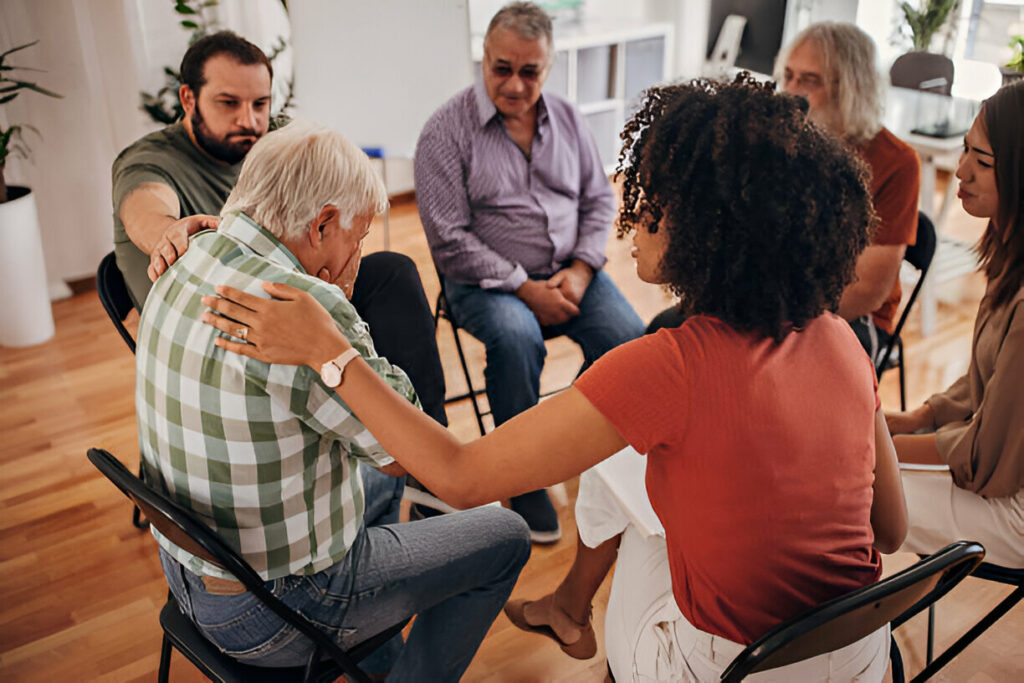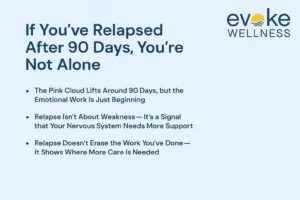It’s usually quiet at first.
A pause. Then a voice says something like:
“I don’t know if I’m even allowed to call.”
Or:
“I was doing fine. And then I wasn’t.”
Sometimes they lead with the timeline—three months, six months, even a year. Like maybe if they can show the clean time, the slip won’t feel so defining.
At Evoke Wellness in San Marcos, Texas, this is the phone call we get most often.
And we always start the same way:
You’re not the first. You’re not the worst. You’re still welcome here.
Why Does Relapse After 90 Days Hurt So Much?
Early sobriety is full of milestones. You’re stacking days. You’re remembering how to live again. You’re finally sleeping, eating, feeling.
But around 90 days, something shifts.
The pink cloud lifts. The newness wears off. People expect you to be “okay” now. But often, the real work is just beginning.
This is when deeper emotional patterns surface—grief you hadn’t touched, loneliness you used to numb, anger you’ve never had to hold sober.
And if you haven’t built the tools to navigate that emotional terrain, relapse isn’t a moral failing. It’s a nervous system reaching for what it knows.
It’s not weakness. It’s a signal.
“I Can’t Believe I Have to Come Back”: The Shame Wall
Many returning clients tell us the same thing:
“I thought I was past this.”
“I feel like I let everyone down.”
“I don’t want people to see me back in treatment.”
There’s a special kind of shame that hits when you’ve been doing well—when you’ve shared your story, posted your milestones, helped someone else through a hard day. You feel like you should have known better.
But here’s the thing:
Knowing better isn’t the same as having everything healed.
Relapse doesn’t erase the work you’ve done. It shows you where more care is needed. And care is never something to be ashamed of.
One Client’s Return: “I Was So Scared to Walk Through That Door Again”
He had been gone just under five months. The first time around, he’d shown up withdrawn, skeptical, half-committed. This time, he was shaking.
“I thought they were going to look at me like I failed.”
But what he got instead was a nod. A hand on the shoulder. Staff who remembered his name, not his mistake.
“That first night back? I actually slept. Because I wasn’t pretending to be okay anymore.”
Stories like his are the reason we keep the door open without conditions. Not everyone gets it right the first time. That doesn’t mean they stop being worthy of support.
What to Expect If You Return to Residential Treatment
Coming back doesn’t mean starting from zero. It means starting from here—with your experience, your insight, and your new needs.
At Evoke Wellness TX, reentry into residential care is tailored with respect:
- You’ll be reassessed, not reprimanded. We look at what worked last time—and what didn’t.
- You’ll get a fresh treatment plan. This isn’t a rerun. It’s a new phase.
- You’ll join a community where relapse is part of the conversation. You won’t be the only one holding a story like yours.
- You’ll rebuild at your pace. Whether you need to go deep or rest first, we’ll meet you there.
The goal isn’t just to get you sober again. It’s to help you feel whole, safe, and supported.
The Healing Power of Saying, “Me Too”
One of the hardest parts of relapse is the isolation. You might scroll through your old support group chats and feel like an outsider. You might dread running into people who “kept going.”
But here’s the truth: a lot of them relapsed too. They just haven’t said it out loud yet.
In our San Marcos residential treatment program, we make space for those confessions.
You’ll hear:
“I was scared to say anything.”
“I thought about not coming back. Then I remembered what it felt like here.”
“Relapse didn’t erase me. It woke me up.”
Hearing “me too” in a room full of people who know the sting—that’s where shame begins to loosen its grip.
Why Residential Treatment Is Still the Right Move—Even Now
It’s tempting to say, “I just need a meeting,” or “I’ll tighten up my routine.” But if the relapse cut deep—emotionally, mentally, or physically—residential treatment gives you the space to heal fully.
Why it’s worth returning:
- Distraction-free focus: Being removed from your daily environment matters, especially if triggers or relationships were part of the slip.
- 24/7 support: When shame hits at 2am, you’re not alone.
- Time to grieve and process: Because yes, relapse often brings loss—and that deserves care.
- A new lens on old wounds: Sometimes relapse reveals trauma you bypassed the first time. We can help you work through it.
This isn’t punishment. It’s sanctuary.
“I Thought I’d Be Judged. Instead, I Was Seen.”
That’s the phrase that shows up again and again in alumni surveys and anonymous notes.
Whether it’s your first call back or your third, what we want you to know is this:
We still see the best in you—even if you can’t see it yet.
We know what it means to return. It means something inside you still wants life. Still believes change is possible. Still dares to trust someone with your hurt.
We’re honored to be that someone.
FAQs: If You’ve Recently Relapsed and Are Considering Coming Back
Is relapse after 3–6 months common?
Yes. In fact, it’s one of the most vulnerable points in early recovery. You’re emotionally raw, your brain chemistry is still stabilizing, and the world expects you to be “okay.” Many people return to treatment during this stretch.
Will I be treated differently if I’m coming back?
No. You will be welcomed with the same compassion, structure, and support. Our team is trained to meet you with dignity, not judgment. You’re not repeating—you’re building forward.
What if I’m embarrassed to see people I knew from last time?
That’s understandable. But more often than not, they’re just relieved to see you. And many of them may have their own stories of struggle since leaving. Vulnerability breeds connection—not rejection.
Can I adjust my treatment plan this time?
Absolutely. We’ll work with you to re-evaluate what’s most helpful based on where you are now—not where you were last time.
How soon can I return to treatment after a relapse?
In most cases, we can begin intake quickly—especially if you’ve been through our program before. Call us and we’ll walk you through the next steps, no pressure.
The Phone Call You Can Still Make
We know the silence you’ve been sitting in. The questions. The spinning thoughts.
“Do I still have a place there?”
“Will they think I failed?”
“Do I deserve another chance?”
Our answer: Yes. Yes. Always, yes.
At Evoke Wellness in San Marcos, Texas, our residential treatment program is open to returners, not just first-timers. We believe healing isn’t linear. And neither is your worth.
Call (888) 450-2285 or visit our Residential Treatment services page to take your next step. You don’t need a speech. You just need to pick up the phone.



